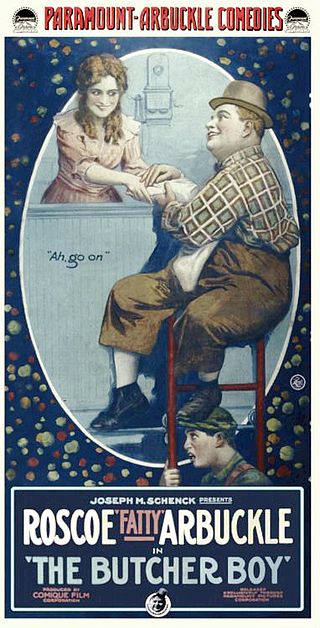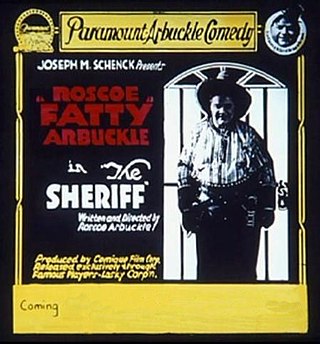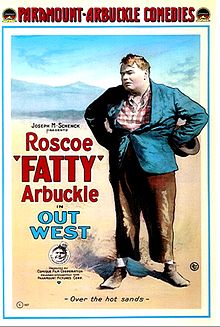
Roscoe Conkling "Fatty" Arbuckle was an American silent film actor, director, and screenwriter. He started at the Selig Polyscope Company and eventually moved to Keystone Studios, where he worked with Mabel Normand and Harold Lloyd as well as with his nephew, Al St. John. He also mentored Charlie Chaplin, Monty Banks and Bob Hope, and brought vaudeville star Buster Keaton into the movie business. Arbuckle was one of the most popular silent stars of the 1910s and one of the highest-paid actors in Hollywood, signing a contract in 1920 with Paramount Pictures for $1,000,000 a year.

Al St. John was an early American motion-picture comedian. He was a nephew of silent film star Roscoe "Fatty" Arbuckle, with whom he often performed on screen. St. John was employed by Mack Sennett and also worked with many other leading players such as Charlie Chaplin, Buster Keaton and Mabel Normand. His film career successfully transitioned from the silent era into sound, and by the late 1930s and 1940s he was working predominantly in Westerns, often portraying the scruffy comedy-relief character "Fuzzy Q. Jones". Among his notable performances in that role are in the "Billy the Kid" series of films released by the Producers Releasing Corporation from 1940 to 1946 and in that company's "Lone Rider" series from 1941 to 1943.

The Butcher Boy is a 1917 American two-reel silent comedy film written by, directed by, and starring Roscoe "Fatty" Arbuckle and featuring Al St. John, Buster Keaton and Alice Lake. This was the first in Arbuckle's series of films with the Comique Film Corporation, and Keaton's film debut.

The Cook is a 1918 American two-reel silent comedy film written by, directed by, and starring Roscoe "Fatty" Arbuckle and featuring Buster Keaton and Al St. John. The movie is a slapstick comedy and focuses on goings-on at a high-end restaurant with Arbuckle as the Cook and Keaton as the Waiter.

Good Night, Nurse! is a 1918 American two-reel silent comedy film written by, and directed by, and starring Roscoe "Fatty" Arbuckle and featuring Buster Keaton. Roscoe's character's wife reaches the last straw with his drinking and admits him to the No Hope Sanatorium, which promises to cure all cases of alcoholism.

Back Stage is a 1919 American two-reel silent comedy film directed by and starring Roscoe "Fatty" Arbuckle and featuring Buster Keaton and Al St. John.

The Round-Up is a 1920 American silent Western film starring Roscoe "Fatty" Arbuckle and featuring Wallace Beery. The movie was written by Edmund Day and Tom Forman, directed by George Melford, and based on Day's play that was a huge hit for Roscoe Arbuckle's older cousin Macklyn Arbuckle and Julia Dean on the Broadway stage in 1907. It was Macklyn in the play who created the famous phrase used in advertisements of the film, nobody loves a fat man.

The Garage is a 1920 American two-reel silent comedy film directed by and starring Roscoe "Fatty" Arbuckle and featuring Buster Keaton. This was the fourteenth and last film starring the duo before Keaton set up his own studio and Arbuckle started making feature-length films. The film also stars Luke the Dog, who starred in many other short comedies with Arbuckle. The film was also known as Fire Chief.

The Bell Boy is a 1918 American two-reel silent comedy film directed by Roscoe "Fatty" Arbuckle for the Comique film company.

Coney Island is a 1917 American two-reel silent comedy film starring, written and directed by Roscoe "Fatty" Arbuckle and featuring Buster Keaton.

The Waiters' Ball is a 1916 American silent short comedy film directed by and starring Fatty Arbuckle. Arbuckle's nephew Al St. John has a memorable role as Roscoe's rival. The film is extant.

The Rough House is a 1917 American two-reel silent comedy film written by, directed by, and starring both Roscoe "Fatty" Arbuckle and Buster Keaton. The Rough House was Keaton's first film as a director.

His Wedding Night is a 1917 American two-reel silent comedy film written, directed by, and starring Roscoe "Fatty" Arbuckle.

Oh Doctor! is a 1917 American two-reel silent comedy film directed by and starring Roscoe "Fatty" Arbuckle and featuring Buster Keaton.

A Country Hero is a 1917 American two-reel silent comedy film directed by and starring Roscoe "Fatty" Arbuckle and featuring Buster Keaton. The film is considered to be lost.

Moonshine is a 1918 American two-reel silent comedy film directed by and starring Roscoe "Fatty" Arbuckle and featuring Buster Keaton. The movie is available on YouTube.

The Sheriff is a 1918 American short comedy film directed by and starring Roscoe "Fatty" Arbuckle. The film is considered to be lost.

A Desert Hero is a 1919 American short comedy film directed by and starring Fatty Arbuckle. The film is considered to be lost.

The Hayseed is a 1919 American two-reel silent comedy film directed by and starring Roscoe "Fatty" Arbuckle and featuring Buster Keaton.

Luke the Dog (1913–1926) was an American Pit Bull Terrier that performed as a recurring character in American silent comedy shorts between 1914 and 1920. Some claim he was a "Staffordshire Bull terrier" or "American Staffordshire bull terrier but neither of these breeds existed until the 1930's, and this is why his name nickname was Luke the pitbull.





















